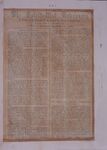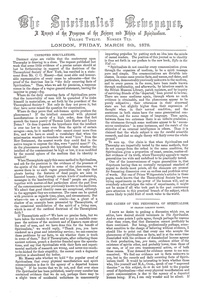Unproved Speculations
Distinct signs are visible that the controversy upon Theosophy is drawing to a close. The request published last week that some little evidence of a precise nature should at last be forthcoming in support of the doctrines of the Theosophical Society of New York, has resulted in a statement from Mr. C. C. Massey—that most able and honourable representative of every cause he advocates—that the proof of the doctrines lies in “the daily occurring facts of Spiritualism.” Thus, when we ask for precision, a response comes in the shape of a vague general statement, leaving the inquirer to grasp—fog.
Where do the daily occurring facts of Spiritualism prove that the immortality of man will be quenched if he sinks himself in materialism, as set forth by the president of the Theosophical Society? Not only do they not prove it, but they have never raised the question for examination.
Where do they prove that sub-human spirits produce the phenomena? If the intellect connected with physical manifestations is rarely of a high order, does that fact quench the trance poetry of Thomas Lake Harris and Lizzie Doten? Or does it quench the hypothesis that the intellect is ever too low to come even from the spirits of certain savages—men, be it marked—who cannot count more than five, and who have so small a vocabulary that when the missionaries wanted to translate the word “love” from the New Testament, the nearest words they could find in the native tongue to express the idea, were “putrid meat?” Or, do the phenomena quench the hypothesis that whether the intellect of the communicant be high or low, it is so modified by the mental sphere of the medium that its identity is masked?
When Theosophists apply this same method to Spiritualism, and ask for the precision in the evidence of the presence of the spirits of the departed in some of the phenomena, we answer them in no such vague generalities, but reply that ghosts having the features of dead people are seen in haunted houses; that through certain kinds of mediumship, messages in the handwriting of “dead” people are given, together with matter-of-fact particulars about the past lives of the communicants never previously known to the mediums. We admit that good identity cases are exceptional, although in the aggregate they are numerous. The cases can be quoted with precision as regards time, place, and circumstance. But where—to use a spiritualistic simile—has a ghost of a shadow of an example been presented by Theosophists, of the occasional annihilation of the spirit of a living man, which is one of the cardinal doctrines of the Theosophical faith?
If Theosophists said—“We have no precise facts, but we have taken the trouble to collect and to put in readable compass the notions of the ancients and of Eastern races about the soul of man, and we have done this for the benefit of Spiritualists,” we would reply, “Thank you, you have rendered us a great and interesting service; we can examine these problems by our facts, to see whether there is truth in some of them.” But if Theosophists, after collecting these ancient notions, preach a doctrine founded upon the speculations, and say that Spiritualists with their facts and experimental methods of research are wrong, and never-too-muchto-be-kicked for their stupidity, the sooner such a dogmatic position is abandoned the better.
Mr. Massey asks whether we hold “the popular creed of Spiritualism that every physical manifestation and spirit communication is due to the agency of a departed human being.” If he knows that we do not, and that ever since The Spiritualist has been published, nearly every number has contained evidence that we do not, perhaps there may be a slight trace of accidental unfairness in unnecessarily importing prejudice by putting such an idea into the minds of casual readers. The position of this journal as to identity is thus set forth in our preface to the new book, Rifts in the Veil:—
“Spiritualists do not consider every communication given through the organism of medium, to be a spirit message pure and simple. The communications are divisible into classes. In some cases precise facts, and names, and dates, and particulars, demonstrably previously unknown to the medium, and to every person in the room, have been made known through mediumship, and afterwards, by laborious search in the British Museum Library, parish registers, and by inquiry of surviving friends of the ‘departed,’ been proved to be true. There are some mediums again, through whom no such evidence is obtainable, and the phenomena appear to be purely subjective; their utterances in their abnormal state are but slightly higher than their expression of thought when in their normal condition, and the sentences in both states have the same grammatical construction, and the same range of language. Then again, between these two extremes there is an infinite gradation; the utterances through some mediums appear to be ‘unconscious cerebration’ in some instances, and the result of the stimulus of an external intelligence in others. Thus it is claimed that the whole subject is one for careful scientific research, and that no single theory will fairly cover the whole ground.”
To sum up. Our claim is that when Spiritualism and Theosophy are impartially tested by the same methods, they do not emerge from the ordeal in the same condition, for Spiritualism gives a proportion of exact, precise, matter-off-act evidence of its truth, where Theosophy appeals to vague generalities too wide and undefined to be practically tested.
One of the inconveniences of vague generalities is, that disputants having then no mutually recognised standard of appeal to decide moot points, all the elements are present for fomenting dissension over an endless and profitless array of words. But one of Prince Wittgenstein’s articles in these pages, made known that the Theosophical Society has been trying experiments on the power of the human will, and as everybody acknowledges the value of experiments, it might not be amiss if all who took, part in the past controversy gave attention to this practical branch of the subject, which seems likely to yield fruit of much value to the world.
The Causes of the Phenomena of Spiritualism
I Have no desire to prolong a discussion which you, as editor, have desired should terminate in The Spiritualist. And on some points I quite agree, though perhaps for reasons other than yours, that that discussion cannot profitably be there continued. But being, professionally perhaps, somewhat sensitive to the charge of believing without evidence, I should like to point out that every one who accepts the phenomena of Spiritualism as facts, and is at the same time dissatisfied with the evidence of disembodied human agency in their production, has, pro tanto, evidence either of the existence of spirits other, and probably lower, than those of our race, or of our own trans corporeal action, or of both these causes. Your demand for evidence seems to me misconceived. We find our evidence not in facts unknown to you, but in the records and daily occurring facts of Spiritualism itself. It would be interesting to learn whether those who, like yourself and M.A., Oxon., speak of our “unproved theories” on this subject, do or do not hold to the popular creed of Spiritualism—that every physical manifestation and spirit communication is due to the agency of a departed human being. If so, I can only wonder and be silent. If <... continues on page 4-242 >
Editor's notes
-
London Spiritualist, No. 289, March 8, 1878, p. 109


